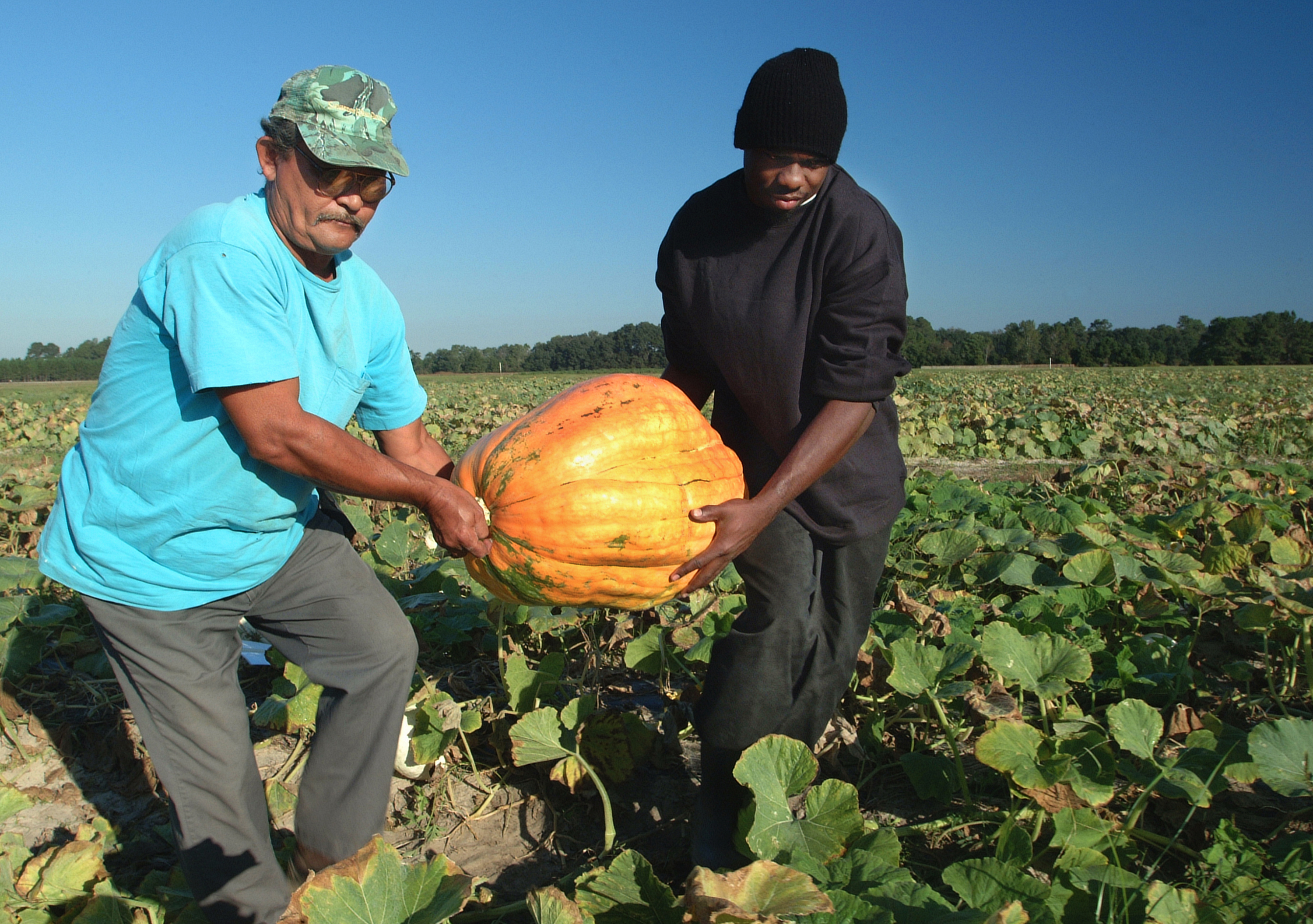
University of Florida farm workers Juan Centeno, left, and Renaldo Ford harvest a large pumpkin at UF’s North Florida Research and Education Center in Live Oak. Credit: Tyler Jones, UF/IFAS Photography
Beverly James, UF/IFAS Communications Service
The University of Florida Institute of Food and Agricultural Sciences is getting the word out on updates to the federal Worker Protection Standard. Changes take effect January 2017.
The Worker Protection Standard (WPS) is a regulation originally issued by the U.S. Environmental Protection Agency in 1992, but was most recently revised in 2015, and goes into effect in 2017. ‘This regulation is primarily intended to reduce the risks of illness or injury to workers and handlers resulting from occupational exposures to pesticides used in the production of agricultural plants on agricultural establishments,’ said Fred Fishel, professor of agronomy and director of the Pesticide Information Office. “This includes farms, forests, nurseries and enclosed space production facilities such as greenhouses,” he said.
Workers are generally those who perform hand-labor tasks in pesticide-treated crops, such as harvesting, thinning, and pruning. Handlers are usually those that are in direct contact with pesticides such as mixing, loading, or applying pesticides.
“The WPS requires agricultural employers and commercial pesticide handler employers to provide specific information and protections to workers, handlers and other persons when WPS-labeled pesticide products are used on agricultural establishments in the production of agricultural plants,” Fishel said. “It also requires owners of agricultural establishments to provide certain protections for themselves and their immediate family, requires handlers to wear the labeling-specified clothing and personal protective equipment when performing handler activities, and to take measures to protect workers and other persons during pesticide applications,” he said.
Summary 2015 WPS requirements going into effect:
Effective January 2, 2017:
- Annual mandatory training for workers and handlers.
- No grace period to train workers (there has never been a grace period to train handlers).
- Record keeping of handler and worker training.
- Minimum age requirement of 18 years old for pesticide handlers or early-entry workers entering into a treated site before the REI has expired.
- Expanded mandatory posting of no-entry signs for outdoor production (e.g., farms, forests, and nurseries) if the REI is greater than 48 hours.
- Recordkeeping and posting of pesticide application information and hazard information (i.e., SDS).
- Anti-retaliation protections strengthened.
- Requirements for medical evaluation, fit testing and specific training for use of respirators and the associated record keeping.
- Provide specific amounts of water to be used for routine decontamination.
- Provide water for emergency eye flushing for handlers at mixing/loading sites if protective eyewear is required by the pesticide product labeling.
- Continued exemption for owners and their immediate family with an expanded definition of immediate family.
- During pesticide applications, agricultural employers must keep workers and other persons out of the AEZ surrounding the pesticide application equipment within the establishment’s property boundary.
Additional changes to the WPS will go into effect January 2, 2018.
Changes to WPS are being enclosed with the following pesticide training manuals issued by the UF/IFAS Extension Bookstore:
- SM53 – Private Applicator Agricultural Pest Control
- SM41 – Aerial Application
- SM5 – Agricultural Row Crop Pest Control
- SM63 – Agricultural Tree Crop Pest Control
- SM43 – Forest Pest Control
- SM61 – Soil & Greenhouse Fumigation
For more information, contact Fred Fishel at the UF/IFAS Pesticide Information Office: weeddr@ufl.edu, 352-392-4721.
- Making the Most of High Cattle Prices – Grow More of Your Own Feed - July 18, 2025
- Friday Feature:1960 Corn Farmer - July 18, 2025
- June 2025 Weather Summary and Three-Month Outlook - July 11, 2025
